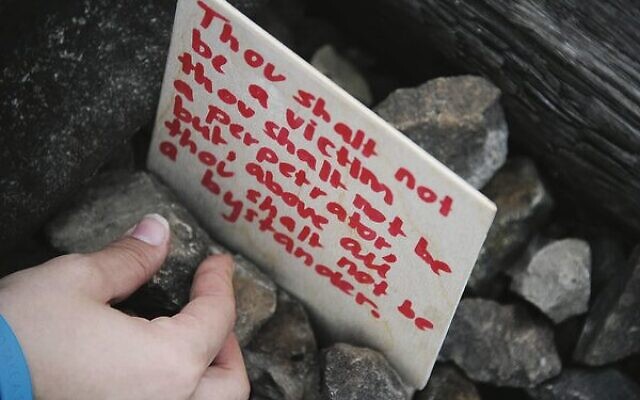Crucial lessons learnt from Shoah study
The message is clear – Holocaust knowledge and awareness are directly associated with a more caring and cohesive society.

The Gandel Holocaust Survey, undertaken by researchers at Deakin University, has revealed significant benefits for Australia’s social fabric from Holocaust knowledge and awareness.
The findings show that, on average, people with greater Holocaust knowledge and awareness have warmer, more positive feelings towards minority groups including Jews and other religious minorities such as Hindus, Muslims and Buddhist. The same warmer feelings were expressed towards vulnerable groups such as asylum seekers and our First Nations peoples.
The message is clear – Holocaust knowledge and awareness are directly associated with a more caring and cohesive society.
Clearly, Holocaust education through schools, museums and centres will strengthen the very fabric of our society.
Another vitally important and critically relevant finding from this survey is that Australians put a significant value on having Holocaust museums and educational institutions. It may be that only a quarter of Australians ever visited a Holocaust museum or a centre in Australia or overseas, but 78 per cent believe it is valuable to have such institutions in the community.
This and other related results show there is “an abiding value of Holocaust museums and centres in delivering Holocaust education as well as memorialisation”, according to the researchers. This is a key message for all the Holocaust educational organisations and institutions – they are absolutely essential to ensure the story of the Holocaust, and its lessons for our society and for human rights, continue to live on.
It is therefore exceptionally heartening, and timely, that the federal government recently provided significant funding to redevelop existing and build new Holocaust museums in centres so that, very soon, every capital city will have one.
As the whole world marks the International Holocaust Remembrance Day, in Australia we finally have an opportunity to understand more deeply what the public knows, and how it feels about Holocaust knowledge and education.
The results of the first nation-wide comprehensive study, the Gandel Holocaust Knowledge and Awareness in Australia Survey, have just been published. While the findings are largely positive and compare well to similar surveys in the US and Canada, there are also concerns about particular gaps in knowledge, especially among younger generations such as the Millennials and Gen X.
We should take great comfort in the firm conclusion by the Deakin University researchers that a vast majority of Australians, or 83 per cent, “acknowledge the true scale of the Holocaust and care about Holocaust education”. That should give us all hope that, with more structured and more engaged education, either through schools or Holocaust museums and centres, we can enable all Australians to be better informed about the Holocaust, to know the facts, and to understand the lessons of the Holocaust as they apply in our world today.
In addition, while the Millennials (and Gen X-ers) may know less about the facts of the Holocaust, the Gandel Holocaust Survey researchers concluded that “they have an abiding care about the impact of the Holocaust among their generation”.
If we can find ways to reach those younger people in ways that ‘speak to them’ and on their own terms, as it were, they will very likely be willing to learn and to understand more.
If we are able to engage our younger generations, they will become a force for good.
Over the years, I have met and spoken to many Holocaust survivors. They always told me that we all have a collective duty to keep the memory of the Holocaust alive. Sadly, as time goes by there are less and less survivors in our midst, which means we will need to work even harder to preserve their memories, their stories and the lessons of the Holocaust.
But, we and many of our partners and collaborators have the will and the drive to honour their legacy, to strengthen Holocaust knowledge and awareness, and to help build a more caring and humane society. It is only through knowledge that we can hope to ensure the Holocaust never happens again. We owe that much to all those who perished in the Holocaust, and all those who survived it.
Following on the release of this report, Gandel Foundation plans on working with like-minded organisations and individuals to promote the recommendations of the Gandel Holocaust Survey and advocate with all the stakeholders for their adoption and implementation.
John Gandel is chairman of the Gandel Foundation.

comments